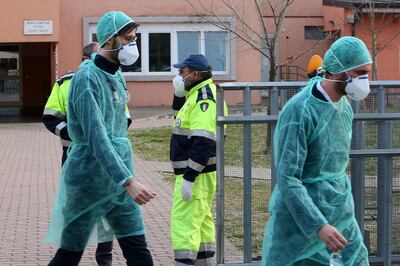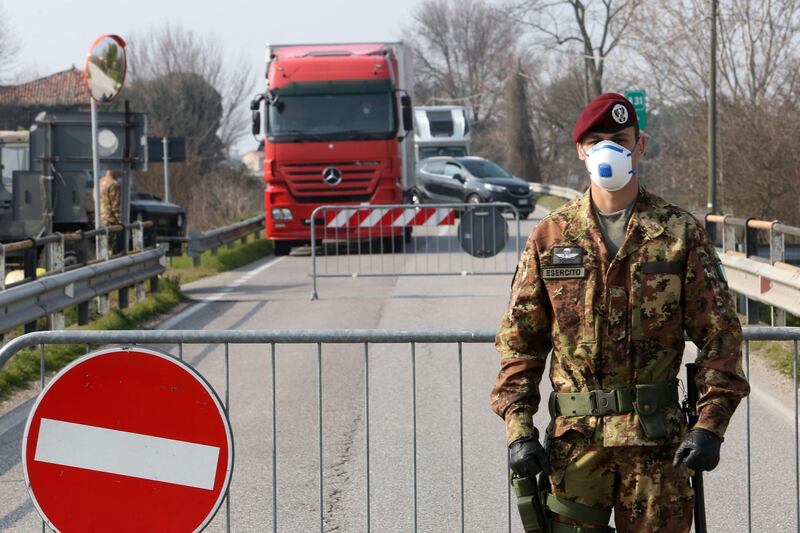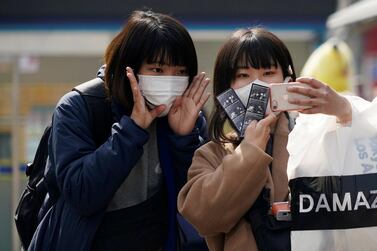Adrian Trevisan was a well-known figure in the village of Vo Euganeo in the shadow of the Euganean Hills west of Venice, and his death from coronavirus triggered not only an area-wide quarantine but a sense of disbelief among his neighbours.
The retired bricklayer was the father of Vanessa, a former mayor of the small settlement of 3,000 people, and a gregarious presence in its streets and cafes.
He died in hospital in nearby Padua and a close 67-year-old friend of his is also fighting the virus.
Vo itself is one of the two epicentres of the Italian coronavirus crisis. While its streets are bathed in sunshine, most are deserted. A few people walk their dogs, and some wear masks. The cafes and shops are closed.
"We've been closed since Saturday," says Massimo Mutta, a restaurant owner.
"We are not allowed to get out of the municipality, the area is blocked, and it looks like it will continue for another 15 days. It's a distressing situation. I can't tell if these provisions are exaggerated, but if it's about safeguarding public health we will just do what we are told."
The regions of Veneto and Lombardy, the richest in Italy, are slowly coming to a standstill. More than 50,000 citizens are blockaded to prevent the virus from spreading, with prison terms of up to three months for those who breach the ministerial decree issued on Sunday. Of the 287 cases of coronavirus confirmed so far, there were more than 200 in Lombardy, about 40 in Veneto and about 20 in Emilia-Romagna, the area around Bologna.

A 70-year-old entrepreneur from the Alpine region between Veneto and Austria tells The National that business has been disrupted: "I'm having a lot of problems with Chinese suppliers who stopped sending me pieces, and with customers cancelling meetings.
“Also, it upset me to read about a man almost my age dying of coronavirus.”
According to Giulio Sapelli, professor of historical economics at the Statale University of Milan, the Italian government is reacting relatively well.
"Unfortunately some panic has arisen among the population," he says. "In any case, concerns for the Italian economy are excessive. The collapse of the stock exchange and the surge in the spread between Italian bonds and German bonds are the result of panic and improvisation.
“Western countries have the operative planning capacity to deal with the crisis.”
Like many in Milan, the country's commercial capital, Mr Sapelli is not letting the crisis affect his daily routine.
Business as usual is a mantra for many entrepreneurs and professionals. Economists are calling on everyone to keep their nerve. But the decline in business is already starting to hit small shops.
Andrea is a bartender at a cafe in the historic centre of Verona to the west of the quarantine zones.
“We are witnessing a big drop in customers, but we are staying open,” he says.
Venice is a tourist city with fewer and fewer visitors after it cancelled the last two days of its carnival, the high point of the winter season.
Alvise Ballarin, a news-stand manager, says his colleagues catering to the tourism trade are in trouble.
"I'm not having any problems because I sell newspapers to locals," he says. "But those who work with tourists are seeing nobody. There's a huge drop in tourists from the rest of Veneto and from all over Italy."
Having recorded Trevisan's death, Padua has been forced to order the closure of its university and exams scheduled for the end of February have been postponed. Many students from southern Italy have returned home, pushed by their parents to leave one of the worst-hit areas.
While there is shock that seven people have died, there is some comfort to be had in the fact that the outbreak remains clustered in two areas.
"The authorities have implemented a health cordon. The worst-affected municipalities are totally isolated," says Giovanni Maga, director of the Institute of Molecular Genetics National Research Council.
“We’re actively looking for cases and that’s why the numbers are growing. Unfortunately, there have been seven deaths but they were all very old people, already debilitated by other ongoing diseases. At the moment the numbers are not alarming.”
Another Vo restaurant owner, Anna is one of many who think the isolation measures imposed by the authorities are too draconian. “I think it’s all over the top,” she says. “I mean, it’s just a flu, nothing more. Usually we’re open and we work a lot on Sundays. However, we’ve already lost a lot of bookings. People come from far away to eat at our restaurant but now everybody is very scared, everywhere.”
A frequent traveller for work, Giacomo is puzzled by the official messaging around the outbreak. “I don’t understand the reason for this chaos. The politicians are exaggerating, the TV too. Some old people have died, I’m deeply sorry, but it happens every time there is the flu. I know it’s not politically correct, especially in an old, TV-obsessed country like Italy, but I think we should accept death with more stoicism.”
At a mall in Torri di Quartesolo, 30 kilometres from Vo, a shop assistant tells The National that customers, especially older people, are showing signs of panic.
“I’ve seen old ladies filling carts with all kinds of items, from disinfectant to Panettone. Even my mom, who is usually a sensible person, is stocking up,” she says.
The streets of Vicenza are also less crowded than usual at the height of the festival season. Among the people promenading, some are wearing surgical masks.
“I am quite worried,” says Achille, 38. “I’m from southern Italy, from the Campania region, and I came to visit my sister. I arrived on Friday, when the crisis broke out. I see few people wearing the mask here, but I think prevention is better than a cure.”







